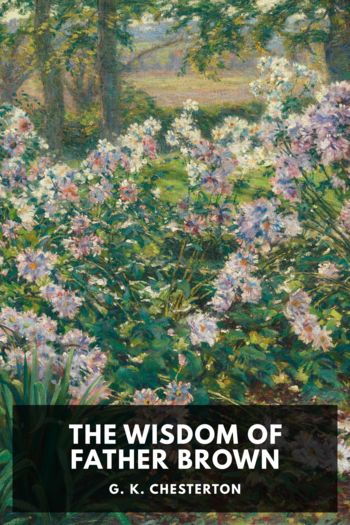The Wisdom of Father Brown - G. K. Chesterton (read full novel .txt) 📗

- Author: G. K. Chesterton
Book online «The Wisdom of Father Brown - G. K. Chesterton (read full novel .txt) 📗». Author G. K. Chesterton
All these trivialities Brown heard and saw; but heard them as a tired man hears a tune in the railway wheels, or saw them as a sick man sees the pattern of his wallpaper. No one can calculate the turns of mood in convalescence: but Father Brown’s depression must have had a great deal to do with his mere unfamiliarity with the sea. For as the river mouth narrowed like the neck of a bottle, and the water grew calmer and the air warmer and more earthly, he seemed to wake up and take notice like a baby. They had reached that phase just after sunset when air and water both look bright, but Earth and all its growing things look almost black by comparison. About this particular evening, however, there was something exceptional. It was one of those rare atmospheres in which a smoked-glass slide seems to have been slid away from between us and Nature; so that even dark colours on that day look more gorgeous than bright colours on cloudier days. The trampled earth of the riverbanks and the peaty stain in the pools did not look drab but glowing umber, and the dark woods astir in the breeze did not look, as usual, dim blue with mere depth of distance, but more like wind-tumbled masses of some vivid violet blossom. This magic clearness and intensity in the colours was further forced on Brown’s slowly reviving senses by something romantic and even secret in the very form of the landscape.
The river was still well wide and deep enough for a pleasure boat so small as theirs; but the curves of the countryside suggested that it was closing in on either hand; the woods seemed to be making broken and flying attempts at bridge-building—as if the boat were passing from the romance of a valley to the romance of a hollow and so to the supreme romance of a tunnel. Beyond this mere look of things there was little for Brown’s freshening fancy to feed on; he saw no human beings, except some gipsies trailing along the river bank, with faggots and osiers cut in the forest; and one sight no longer unconventional, but in such remote parts still uncommon: a dark-haired lady, bareheaded, and paddling her own canoe. If Father Brown ever attached any importance to either of these, he certainly forgot them at the next turn of the river which brought in sight a singular object.
The water seemed to widen and split, being cloven by the dark wedge of a fish-shaped and wooded islet. With the rate at which they went, the islet seemed to swim towards them like a ship; a ship with a very high prow—or, to speak more strictly, a very high funnel. For at the extreme point nearest them stood up an odd-looking building, unlike anything they could remember or connect with any purpose. It was not specially high, but it was too high for its breadth to be called anything but a tower. Yet it appeared to be built entirely of wood, and that in a most unequal and eccentric way. Some of the planks and beams were of good, seasoned oak; some of such wood cut raw and recent; some again of white pinewood, and a great deal more of the same sort of wood painted black with tar. These black beams were set crooked or crisscross at all kinds of angles, giving the whole a most patchy and puzzling appearance. There were one or two windows, which appeared to be coloured and leaded in an old-fashioned but more elaborate style. The travellers looked at it with that paradoxical feeling we have when something reminds us of something, and yet we are certain it is something very different.
Father Brown, even when he was mystified, was clever in analysing his own mystification. And he found himself reflecting that the oddity seemed to consist in a particular shape cut out in an incongruous material; as if one saw a top-hat made of tin, or a frock-coat cut out of tartan. He was sure he had seen timbers of different tints arranged like that somewhere, but never in such architectural proportions. The next moment a glimpse through the dark trees told him all he wanted to know and he laughed. Through a gap in the foliage there appeared for a moment one of those old wooden houses, faced with black beams, which are still to be found here and there in England, but which most of us see imitated in some show called “Old London” or “Shakespeare’s England.” It was in view only long enough for the priest to see that, however old-fashioned, it was a comfortable and well-kept country-house, with flowerbeds in front of it. It had none of the piebald and crazy look of the tower that seemed made out of its refuse.
“What on earth’s this?” said Flambeau, who was still staring at the tower.
Fanshaw’s eyes were shining, and he spoke triumphantly. “Aha! you’ve not seen a place quite like this before, I fancy; that’s why I’ve brought you here, my friend. Now you shall see whether I exaggerate about the mariners of Cornwall. This place belongs to Old Pendragon,





Comments (0)